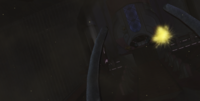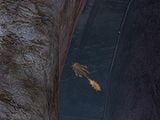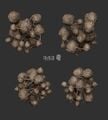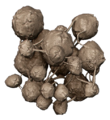Flood spore: Difference between revisions
From Halopedia, the Halo wiki
m (→Trivia: fixing spelling error) |
BaconShelf (talk | contribs) m (→Gallery: reordering images to group H2 ones together) |
||
| (104 intermediate revisions by 67 users not shown) | |||
| Line 1: | Line 1: | ||
{{ | {{Status|Canon}} | ||
{{ | {{Species infobox | ||
|variant=Flood | |||
|name=Flood | |name=Flood spore | ||
|image=[[ | |image=[[File:H2A Epilogue FloodSpore.png|300px]] | ||
| | |latin= | ||
| | |classification=[[Infection form]]{{Ref/Reuse|Enc22}} | ||
|species=[[ | |species=[[Flood]] | ||
| | |subspecies= | ||
|notable= | |diet= | ||
|height= | |||
|weight= | |||
|distinctions=Small, chitinous floating organisms comprised of [[Flood Super Cell]]s{{Ref/Book|Id=Enc22p404|Enc22|Page=404-405}} | |||
|lifespan= | |||
|homeworld= | |||
|techlevel= | |||
|notable-person= | |||
|othernames= | |||
|languages= | |||
}} | }} | ||
{{quote|One single Flood spore can destroy a species.|[[Rtas 'Vadum]]{{Ref/Level|H3|Floodgate}}}} | |||
'''Spores''' are the most basic kind of [[infection form]] in the life cycle of the [[Flood]].{{Ref/Book|Id=Enc22|Enc22|Page=406-407}} | |||
==Overview== | |||
[[File:OSFM FloodSpore.png|thumb|left|Another look at a spore.{{Ref/Book|OSFM|Page=173}}]] | |||
Spores serve as the most basic form of Flood encountered in a given [[Flood outbreak|outbreak]]. They are comprised of [[Flood Super Cell]]s (FSCs) which have encysted themselves to form a chitinous outer layer. This layer protects the cells inside, and allows the spore to float in the air and with the breeze and remain dormant in a given environment for centuries at a time.{{Ref/Reuse|Enc22p404}}{{Ref/Reuse|Enc22}} The exterior is additionally covered with bulbous growths and ragged spines, which can be crushed if grabbed.{{Ref/Novel|SoI}} However, the shape of spores can be variable, allowing them to shape their form to accommodate their environment.{{Ref/Reuse|Enc22}} | |||
== | Upon contact with a suitable host, the spore becomes active and begins to consume the victim it has become attached to - regardless of it is sapient or not. Unlike their larger [[pod infector]] cousins, spores do not immediately convert their host into a [[Flood combat form|combat form]], but instead use them to gestate the production of more FSC and spores - turning the host's biomass into a series of egg-like incubators. This process ultimately culminates with the host gestating larger infection forms inside itself, which then burst free and begin to spread the infection far and wide. This process is extremely painful, as the spores intentionally keep their victims alive while their bodies are reshapen into breeding grounds for future stages of Flood infection. Unfortunately, there is no cure once infected by a spore nor a vaccine which can prevent their infection - or any way to reverse the mutations they inflict. To date, the only known countermeasures for them are containment and incineration.{{Ref/Reuse|Enc22p404}}{{Ref/Reuse|Enc22}} In some cases, the spore itself may serve as the initial basis for an infection form to grow from.{{Ref/Book|Enc11|Page=20}} | ||
* | The creation of Flood spores is a priority for the Flood, especially during the [[Feral Stage]] of a given outbreak.{{Ref/Reuse|Enc22p404}} Upon the establishment of an outbreak, the Flood begin to emit spores into the atmosphere to begin expediting the conversion of the local biosphere as local fauna and flora are converted and broken down. Animals and mangled corpses settled upon by spores are generally turned into static growths such as [[Flood blister|blisters]].{{Ref/Reuse|Enc22}} Overall, the presence of spores precedes the production of larger and more mobile infection forms, which in turn go on to produce the main drivers of Flood outbreak.{{Ref/Reuse|Enc22p404}}{{Ref/Reuse|Enc22}} When an outbreak reaches the later phases of the [[Coordinated Stage]], the bodies of those killed in action against the Flood are turned into massive spore towers, or "[[spore mountain]]s",{{Ref/Novel|Id=Sil|HSil|Chapter=String 26}} at the heart of the established [[Blightlands]] - which themselves begin to pump more spores into the planet's atmosphere as the Flood solidifies its victory over a given world.{{Ref/Reuse|Enc22p404}} Spores may be weaponised by the establishment of Flood structures such as [[Flood launcher|launchers]], which intentionally launch clouds of spores targted at enemy forces with the aim of forcing them to succumb to infection.{{Ref/Game|HW|[[Flood launcher]] in-game unit}} [[Flood dispersal pod]]s may also be used as a vector to launch spore packets onto a target world,{{Ref/Reuse|Sil}}{{Ref/Level|H3|Halo (Halo 3 level)|Halo}} especially from an infected starship in orbit - though such pods may also be generated in ground-based hives and fired with a discharge of built-up gases.{{Ref/Reuse|Enc22}} Naturally-occurring meteors and comets may also be repurposed by the Flood as carriers for spore deposits - aided by the spores' natural longevity.{{Ref/Anthology|HFra|Defender of the Storm}} | ||
* | |||
* | Once a [[Flood outbreak]] is underway, spores are naturally produced as a byproduct of the infection of other hosts. Combat forms and [[Flood pure form|pure forms]] alike gestate spores within their bodies, which are released when the Flood form is attacked or killed.{{Ref/Book|Id=Enc22p408|Enc22|Page=408-409}}{{Ref/Book|Id=Enc22p411|Enc22|Page=411}} The [[Gravemind]] itself produces billions of spores from its own body,{{Ref/Book|Enc11|Page=169}} though seems to be able to control their effect and grant selective immunity to potentially useful allies - such as in the case of [[Thel 'Vadam]]ee, who was captured by the Gravemind and exposed to spore contact without an environment suit though was seemingly unaffected by the changes.{{Ref/Level|H2|Gravemind (level)|Gravemind}} | ||
* | |||
==Gallery== | |||
<gallery> | |||
File:H2 - Flood Spores.png|A Flood spore inside [[High Charity]] in ''[[Halo 2]]''. | |||
File:H2 - Flood Spore.png|Flood spores aboard High Charity in ''Halo 2''. | |||
File:H3 Flood Spore.jpg|A Flood spore in ''[[Halo 3]]''. | |||
File:H2A FloodSpore CutsceneRender.jpg|A render of the Flood spore model developed by [[Blur Studio]] for the cutscenes of ''[[Halo 2: Anniversary]]''. | |||
File:H2A Render FloodSpore.png|A cutout of the untextured render. | |||
</gallery> | |||
==List of appearances== | |||
*''[[Halo 2]]'' {{1st}} | |||
*''[[Halo Graphic Novel]]'' | |||
**''[[The Last Voyage of the Infinite Succor]]'' | |||
*''[[Halo 3]]'' | |||
*''[[Halo Wars]]'' | |||
*''[[Halo: Evolutions]]'' | |||
**''[[The Mona Lisa]]'' | |||
*''[[Halo: Combat Evolved Anniversary]]'' | |||
**''[[Terminal (Halo: Combat Evolved Anniversary)|Terminals]]'' | |||
*''[[Halo: Silentium]]'' {{Mo}} | |||
*''[[Halo 2: Anniversary]]'' | |||
*''[[Halo: Shadow of Intent]]'' {{Mo}} | |||
*''[[Halo: Fractures]]'' | |||
**''[[Defender of the Storm]]'' | |||
*''[[Halo Infinite: Memory Agent]]'' {{Mo}} | |||
*''[[Halo Infinite]]'' {{Mo}} | |||
*''[[Halo: Epitaph]]'' {{Mo}} | |||
*''[[Halo: The Television Series Season Two]]'' | |||
**''[[Halo (TV Series)|Halo]]'' | |||
==Sources== | |||
{{Ref/Sources}} | |||
{{Flood}} | {{Flood}} | ||
[[Category: | [[Category:Flood]] | ||
Latest revision as of 07:55, July 31, 2024
| Flood spore | |
|---|---|
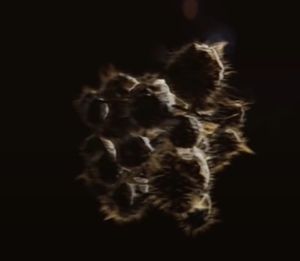
| |
| Biological overview | |
|
Classification: |
|
|
Species: |
|
| Physical information | |
|
Distinctions: |
Small, chitinous floating organisms comprised of Flood Super Cells[2] |
- "One single Flood spore can destroy a species."
- — Rtas 'Vadum[3]
Spores are the most basic kind of infection form in the life cycle of the Flood.[1]
Overview[edit]
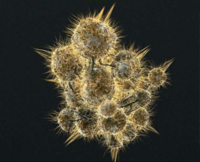
Spores serve as the most basic form of Flood encountered in a given outbreak. They are comprised of Flood Super Cells (FSCs) which have encysted themselves to form a chitinous outer layer. This layer protects the cells inside, and allows the spore to float in the air and with the breeze and remain dormant in a given environment for centuries at a time.[2][1] The exterior is additionally covered with bulbous growths and ragged spines, which can be crushed if grabbed.[5] However, the shape of spores can be variable, allowing them to shape their form to accommodate their environment.[1]
Upon contact with a suitable host, the spore becomes active and begins to consume the victim it has become attached to - regardless of it is sapient or not. Unlike their larger pod infector cousins, spores do not immediately convert their host into a combat form, but instead use them to gestate the production of more FSC and spores - turning the host's biomass into a series of egg-like incubators. This process ultimately culminates with the host gestating larger infection forms inside itself, which then burst free and begin to spread the infection far and wide. This process is extremely painful, as the spores intentionally keep their victims alive while their bodies are reshapen into breeding grounds for future stages of Flood infection. Unfortunately, there is no cure once infected by a spore nor a vaccine which can prevent their infection - or any way to reverse the mutations they inflict. To date, the only known countermeasures for them are containment and incineration.[2][1] In some cases, the spore itself may serve as the initial basis for an infection form to grow from.[6]
The creation of Flood spores is a priority for the Flood, especially during the Feral Stage of a given outbreak.[2] Upon the establishment of an outbreak, the Flood begin to emit spores into the atmosphere to begin expediting the conversion of the local biosphere as local fauna and flora are converted and broken down. Animals and mangled corpses settled upon by spores are generally turned into static growths such as blisters.[1] Overall, the presence of spores precedes the production of larger and more mobile infection forms, which in turn go on to produce the main drivers of Flood outbreak.[2][1] When an outbreak reaches the later phases of the Coordinated Stage, the bodies of those killed in action against the Flood are turned into massive spore towers, or "spore mountains",[7] at the heart of the established Blightlands - which themselves begin to pump more spores into the planet's atmosphere as the Flood solidifies its victory over a given world.[2] Spores may be weaponised by the establishment of Flood structures such as launchers, which intentionally launch clouds of spores targted at enemy forces with the aim of forcing them to succumb to infection.[8] Flood dispersal pods may also be used as a vector to launch spore packets onto a target world,[7][9] especially from an infected starship in orbit - though such pods may also be generated in ground-based hives and fired with a discharge of built-up gases.[1] Naturally-occurring meteors and comets may also be repurposed by the Flood as carriers for spore deposits - aided by the spores' natural longevity.[10]
Once a Flood outbreak is underway, spores are naturally produced as a byproduct of the infection of other hosts. Combat forms and pure forms alike gestate spores within their bodies, which are released when the Flood form is attacked or killed.[11][12] The Gravemind itself produces billions of spores from its own body,[13] though seems to be able to control their effect and grant selective immunity to potentially useful allies - such as in the case of Thel 'Vadamee, who was captured by the Gravemind and exposed to spore contact without an environment suit though was seemingly unaffected by the changes.[14]
Gallery[edit]
A Flood spore inside High Charity in Halo 2.
A Flood spore in Halo 3.
A render of the Flood spore model developed by Blur Studio for the cutscenes of Halo 2: Anniversary.
List of appearances[edit]
- Halo 2 (First appearance)
- Halo Graphic Novel
- Halo 3
- Halo Wars
- Halo: Evolutions
- Halo: Combat Evolved Anniversary
- Halo: Silentium (Mentioned only)
- Halo 2: Anniversary
- Halo: Shadow of Intent (Mentioned only)
- Halo: Fractures
- Halo Infinite: Memory Agent (Mentioned only)
- Halo Infinite (Mentioned only)
- Halo: Epitaph (Mentioned only)
- Halo: The Television Series Season Two
Sources[edit]
- ^ a b c d e f g h Halo Encyclopedia (2022 edition), page 406-407
- ^ a b c d e f Halo Encyclopedia (2022 edition), page 404-405
- ^ Halo 3, campaign level Floodgate
- ^ Halo: Official Spartan Field Manual, page 173
- ^ Halo: Shadow of Intent
- ^ Halo Encyclopedia (2011 edition), page 20
- ^ a b Halo: Silentium, String 26
- ^ Halo Wars, Flood launcher in-game unit
- ^ Halo 3, campaign level Halo
- ^ Halo: Fractures - Defender of the Storm
- ^ Halo Encyclopedia (2022 edition), page 408-409
- ^ Halo Encyclopedia (2022 edition), page 411
- ^ Halo Encyclopedia (2011 edition), page 169
- ^ Halo 2, campaign level Gravemind
| |||||||||||||||||||||||||||||||||
